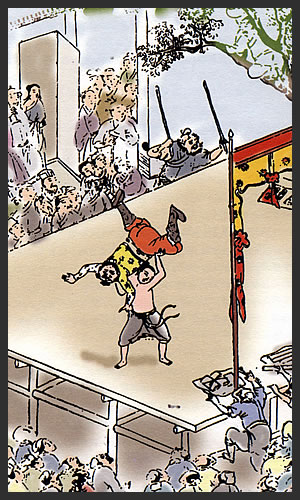Fake professional wrestling grew out of one of the oldest martial arts tradition: the challenge match.
Chinese martial artists sometimes fought on the lei tai to establish dominance over teach martial arts in an area:

...and it was common in feudal Japan for students of one school to invade another school and demand a match. Fighting is at the heart of martial arts, and so determining the best fighter has long been a crucial component.
Fixed wrestling matches grew organically out of economic pressures applied to real challenge matches in the American post-Civil War period:
Wrestling exhibits during the late 19th century were...shown across the United States in countless "athletic shows"...where experienced wrestlers offered open challenges to the audience. It was at these shows, often done for high-stakes gambling purposes, that the nature of the sport changed...
Carnies, who traveled and wrestled at these events, used tricks to protect their money and reputations during competitions, devising little-known and often dangerous wrestling moves, called "hooks." Hooks are illegal in conventional amateur wrestling, but have high rates of success against even the most athletic and experienced of competitors, essentially removing rules from professional wrestling. In addition, some spectators capable of beating the carnies roamed the country to compete in open challenges, setting side bets to make money. The barnstormers competed as traveling wrestlers did and often cooperated with the carnies to stage the matches, providing enormous profits for both sides in betting. Through the interest in money-making among the three groups, wrestling became a business-oriented entertainment venue, distinguishing itself further and further from its authentic amateur wrestling background.
Later, it became popular due to commercialization and television.
The transition from real wrestling to faked matches was not clear nor was it one-way. Japanese shootfighters would transition back and forth from worked matches to real ones, and more recently, pro wrestlers like Brock Lesnar have become legitimate MMA fighters, and MMA fighters like Ken Shamrock and Quenton Jackson have switched over to pro wrestling to make money.
